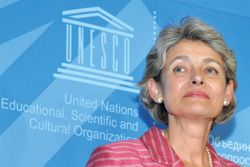 As a continuation of the Silver Jubilee Year celebrations of the Indira Gandhi National Open University (IGNOU) through the year of 2010, the IGNOU Silver Jubilee Special Lecture was organised on “Building Inclusive Knowledge Societies in a Globalised World: Opportunities and Risks” by Her Excellency Ms. Irina G. Bokova, Director General of UNESCO.
As a continuation of the Silver Jubilee Year celebrations of the Indira Gandhi National Open University (IGNOU) through the year of 2010, the IGNOU Silver Jubilee Special Lecture was organised on “Building Inclusive Knowledge Societies in a Globalised World: Opportunities and Risks” by Her Excellency Ms. Irina G. Bokova, Director General of UNESCO.
The function was presided by Smt. D. Purandeswari, the Honourable Minister of State, Ministry of Human Resource Development, Government of India on January 11, 2010 at the Convention Centre, IGNOU Campus, Maidan Garhi, New Delhi.
Professor V. N. Rajasekharan Pillai, Vice Chancellor, IGNOU, while welcoming Ms Irina Bokova, elaborated on the role of IGNOU in providing seamless access to sustainable and learner centric quality education, skill up-gradation, training and capacity building across the country and abroad by making use of innovative technologies in distance education, open learning and online teaching learning methodologies.
He summarised IGNOU's ventures through the convergence of existing systems of teaching-learning for the massive human resources required for promoting integrated national development and global understanding. With EduSat, the University is poised to take giant steps towards Information and Communication Technology, Web and Satellite based education across the globe and pursue flexible and blended learning further.
The IGNOU system can be an effective model for education communities all over the world. For a developing country like India, the Open and Distance Learning (ODL) system has to play a complementary skill development role to the conventional models.
Although the primary aim of Open and Distance Education has been to improve the Gross Enrollment Ratio, this is not going to take place in isolation. The quality of teaching-learning processes needs to be improved. Technology capacitated distance education has enabled us to improve the quality of distance education in classrooms as well as to enhance the reach of education. By acknowledging the nature of the clientele, we have to modify and adapt to the nature and mode of education delivery. A single education strategy is not the solution for a country like India. The Open University system needs to look into strategies outside the formal university set up. We have to make use of the large number of academics and intellectuals available outside the education system, whose capabilities can also be integrated into the programmes, he added.
Minister of State, Ministry of Human Resources Development, Government of India, Smt D. Purandeswari,in her inaugural speech spoke about the efforts of the government in promoting innovations and inclusive education in India. The Right to education has been a landmark in promoting and facilitating education for all.
India has a demographic advantage with over 70% of the population below 35 years. This population, she emphasized, can be tapped on through efficient and effective skills and vocational education. Education when combined with sound macro economic policies would yield good dividends and therefore, expansion, inclusion and quality are the key emphasis in the education sector.
The GER in India is 12.4% while in the world over it is 23.4%. When compared, India's GER is very low. The aim of the government of India is to increase the GER to 25% by 2011-12. The government is also in the process of reforming the education agenda for creating knowledge societies. Quality assurance is important. Legislations to penalize malpractices in higher education are underway. The government is also in the process of facilitating foreign education providers to set up colleges in India.
 In her address, Irina Bokava, while congratulating IGNOU for its initiatives in democratising education in India, reiterated that the Indira Gandhi National Open University is itself a living embodiment of the subject of her address: Building inclusive knowledge societies in a globalised world. She stated that UNESCO is proud to be associated with IGNOU in a number of fields, including journalism and media literacy, and hosting UNESCO chairs in different areas.
In her address, Irina Bokava, while congratulating IGNOU for its initiatives in democratising education in India, reiterated that the Indira Gandhi National Open University is itself a living embodiment of the subject of her address: Building inclusive knowledge societies in a globalised world. She stated that UNESCO is proud to be associated with IGNOU in a number of fields, including journalism and media literacy, and hosting UNESCO chairs in different areas.
Fact File:
Ms Irina Bokova who took office as the Director General of UNESCO in September, 2009, also became the first woman to assume the office. The former Bulgarian foreign minister is a successor of Koichiro Matsuura. She has reiterated UNESCO's commitment towards building a just society, and has added a new focus on climate science and water crisis while rigorously defending freedom of expression. Her visit to India in January 2010 has been her first official visit to India, and her lecture at IGNOU a first in any Indian University.
With regard to India's role in helping shape UNESCO's vision, she stated that India has helped to build a structure capable of transforming elevated principles into concrete actions. With its huge cultural and linguistic diversity, and its spectacular economic advances, India is a leading example of how to reconcile tradition with modernity. India is at the forefront of efforts to ensure that UNESCO remains responsive and relevant in a fast changing world- by contributing to the formulation of UNESCO's policies and strategies.
Building Inclusive Knowledge Societies in a Globalised World: Opportunities and Risks – Irina G. Bokova
Millennium Development Goals (MDGs): An Absolute Minimum for Any Country
Bokova stated that today the world is multi-polar and interdependent, driven by formidable advances in technology that have an impact on every sphere of human activity.
For many of us, these changes enrich our lives in ways previously unimaginable: our globalised world is a treasure-chest of possibilities! Globalisation has lifted millions out of poverty. It has witnessed the emergence of middle classes in countries where there were once just the elites and the poor. These middle classes have purchasing power and a whole new set of ambitions.
However, “Poverty,” as the revered Mahatma Gandhi said, “is the worst form of violence.” In the age of the Internet, mobile phones and unprecedented scientific advances, some 1.4 billion people live on less than $1.25 dollar a day. The financial crisis has sent shock waves the world over, from corporate hubs to towns and to the most remote villages. The MDGs constitute one of the most ambitious roadmaps ever adopted with the goal to “End Poverty by 2015.”
MDGs reflect a global commitment to restoring human dignity through better livelihoods, health, nutrition, education, sanitation and women's empowerment. They represent an absolute minimum for any country, the foundation for building more inclusive, more just societies.
New Humanism: Harnessing Change for Common Good
While emphasising the need for creating a just society, Bokova highlighted the role of humanitarian ethics that play a pivotal role in building an inclusive society.
The vision is that of creating a philosophy of new humanism. Adaptation to the immense speed of change must go hand in hand with a re-iteration of enduring values. Without social inclusion, humanity will not ride the wave of change, it will be overwhelmed by it. Without an ethics of climate change, disastrous consequences of global warming cannot be averted. Without good governance, economic growth cannot deliver all its benefits. The need today is for clearly stated values that guide and drive policies, she stated.
Culture of Inclusion: Addressing Root Causes of Marginalisation in Education
Bokova, while announcing the launch of the 2010 edition of the Education for All Global Monitoring Report at the United Nations in New York, stated that the report warns that education for all is at risk not only because of the economic downturn but because governments in many countries are not doing enough to address the root causes of marginalisation in education. Against this backdrop, the first priority in combating marginalisation is to guarantee equitable access to education to out of school children, female literacy and addressing issues related to exclusion, including caste, language, disability, HIV and AIDS.
Speaking about the launch of a National Mission on Education through ICT by the government of India, she emphasised that India is using ICT in truly original ways to empower marginalised communities and minority groups. UNESCO has worked hand in hand with the stakeholders in a number of these intiatives




















